Confidentiality in Medical Law
Added on 2023-01-20
28 Pages9056 Words29 Views
Running head: MEDICAL LAW
Medical law
Name of the student
Name of the university
Author note
Medical law
Name of the student
Name of the university
Author note
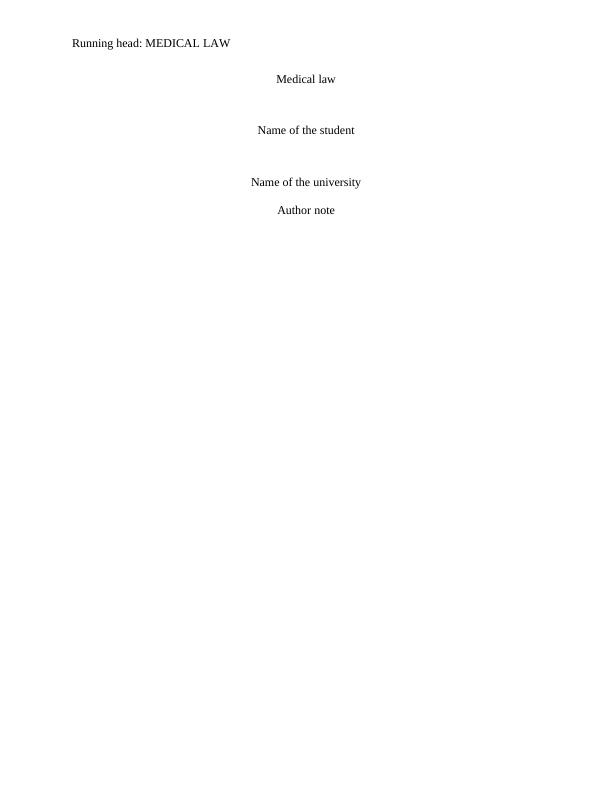
1
MEDICAL LAW
Introduction
Confidentiality is an essential element to the protection of trust and commitment between
the doctor and their patients. The ethical basis of this is consequentialist. Focus should be given
to improve the welfare of the public. There is a large communitarian people’s curiosity in the
preservation of the assurances. Thus preservation of the confidentiality is important for securing
the public health. Failure to preserve the confidentiality of the patients might lead to suboptimal
treatment. The Convention held in 1997 by Human Rights and Biomedicine of Council of
Europe had included a new proposition for the right which states that there is a right not to
inform anyone about anyone else's health information to respect individual's right to report to
keep his life private1. Hence it can be said that privacy in the health sector which was once
considered a medical record property had transformed into a right of "secrecy" to come to a point
where it has been extended to cover personal intimacy wherein one's health data is not disclosed
to other. The doctors and health care professionals had long been upholding the ethical principles
of privacy and confidentiality. It is also the ethical duty of the health care professionals to the
preserve the medial information of the patient even after the death. Disclosure of medial
information without the patient consent might occur for the sake of greater good2. Under specific
guidance on the confidentiality in the context of child protection. Confidential medical records
are recognised in laws as being in public interest. Disclosure might be justified for protecting the
public or community from the threat of serious crime3. Again in case of emergency situations
1 Whitty, Jennifer A., et al. "Patient and nurse preferences for implementation of bedside handover: do they agree?
Findings from a discrete choice experiment." Health expectations 20.4 (2017): 742-750.
2 Bourgeois, Fabienne C., Daniel J. Nigrin, and Marvin B. Harper. "Preserving patient privacy and confidentiality in
the era of personal health records." Pediatrics 135.5 (2015): e1125-e1127
3 Beltran-Aroca, Cristina M., et al. "Confidentiality breaches in clinical practice: what happens in hospitals?." BMC
medical ethics 17.1 (2016): 52.
MEDICAL LAW
Introduction
Confidentiality is an essential element to the protection of trust and commitment between
the doctor and their patients. The ethical basis of this is consequentialist. Focus should be given
to improve the welfare of the public. There is a large communitarian people’s curiosity in the
preservation of the assurances. Thus preservation of the confidentiality is important for securing
the public health. Failure to preserve the confidentiality of the patients might lead to suboptimal
treatment. The Convention held in 1997 by Human Rights and Biomedicine of Council of
Europe had included a new proposition for the right which states that there is a right not to
inform anyone about anyone else's health information to respect individual's right to report to
keep his life private1. Hence it can be said that privacy in the health sector which was once
considered a medical record property had transformed into a right of "secrecy" to come to a point
where it has been extended to cover personal intimacy wherein one's health data is not disclosed
to other. The doctors and health care professionals had long been upholding the ethical principles
of privacy and confidentiality. It is also the ethical duty of the health care professionals to the
preserve the medial information of the patient even after the death. Disclosure of medial
information without the patient consent might occur for the sake of greater good2. Under specific
guidance on the confidentiality in the context of child protection. Confidential medical records
are recognised in laws as being in public interest. Disclosure might be justified for protecting the
public or community from the threat of serious crime3. Again in case of emergency situations
1 Whitty, Jennifer A., et al. "Patient and nurse preferences for implementation of bedside handover: do they agree?
Findings from a discrete choice experiment." Health expectations 20.4 (2017): 742-750.
2 Bourgeois, Fabienne C., Daniel J. Nigrin, and Marvin B. Harper. "Preserving patient privacy and confidentiality in
the era of personal health records." Pediatrics 135.5 (2015): e1125-e1127
3 Beltran-Aroca, Cristina M., et al. "Confidentiality breaches in clinical practice: what happens in hospitals?." BMC
medical ethics 17.1 (2016): 52.
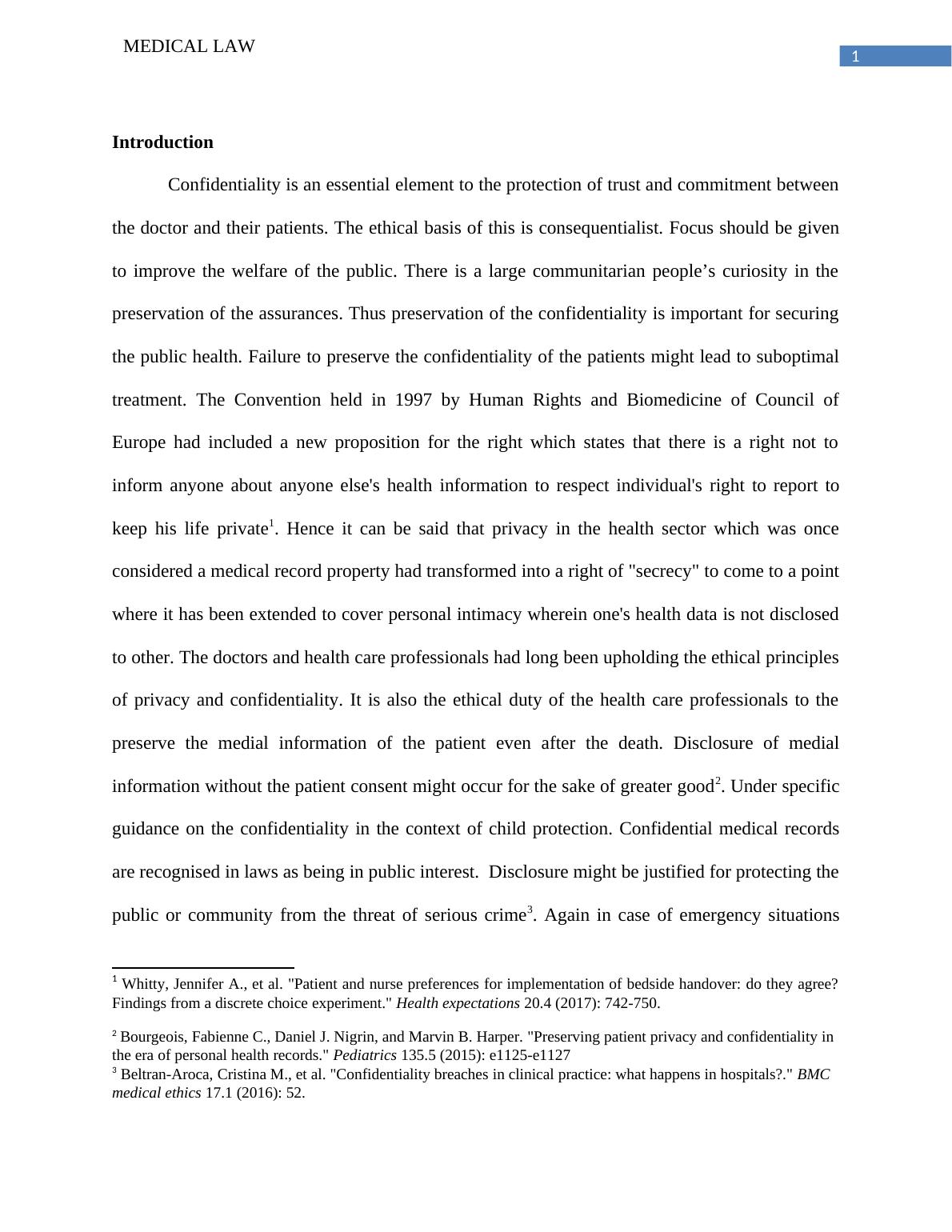
2
MEDICAL LAW
like accidents, the doctors are liable to provide patient information to the police for further
investigation. Again, the medical practitioners also have to disclose medical information in case
the national security is at stake. There can be circumstances where disclosing personal without
the consent of the patient is justified in the public interest. The British Medical association had
asked to consider the usefulness of breaching the patient confidentiality and risking the trust of
the public.
However, in order to provide a justifiable reason for confidentiality breaching, it is
necessary to understand what confidentiality is and how breaching of confidentiality and
disclosure of the patient information without the consent of the patient impact the care of the
patient, evidenced by the various privacy and the confidentiality law of United Kingdom4. The
paper further aim to describe how the confidentiality law affects the therapeutic relationship
between a therapist and a doctor. This will be further followed by a discussion as on what
circumstances might be the health care professionals bound to disclose patient information for
the sake of public safety, especially in case of communicable diseases like HIV and tuberculosis,
provided that the disclosure has been made under law under law.
4 Whitty, Jennifer A., et al. "Patient and nurse preferences for implementation of bedside handover: do they agree?
Findings from a discrete choice experiment." Health expectations 20.4 (2017): 742-750.
MEDICAL LAW
like accidents, the doctors are liable to provide patient information to the police for further
investigation. Again, the medical practitioners also have to disclose medical information in case
the national security is at stake. There can be circumstances where disclosing personal without
the consent of the patient is justified in the public interest. The British Medical association had
asked to consider the usefulness of breaching the patient confidentiality and risking the trust of
the public.
However, in order to provide a justifiable reason for confidentiality breaching, it is
necessary to understand what confidentiality is and how breaching of confidentiality and
disclosure of the patient information without the consent of the patient impact the care of the
patient, evidenced by the various privacy and the confidentiality law of United Kingdom4. The
paper further aim to describe how the confidentiality law affects the therapeutic relationship
between a therapist and a doctor. This will be further followed by a discussion as on what
circumstances might be the health care professionals bound to disclose patient information for
the sake of public safety, especially in case of communicable diseases like HIV and tuberculosis,
provided that the disclosure has been made under law under law.
4 Whitty, Jennifer A., et al. "Patient and nurse preferences for implementation of bedside handover: do they agree?
Findings from a discrete choice experiment." Health expectations 20.4 (2017): 742-750.
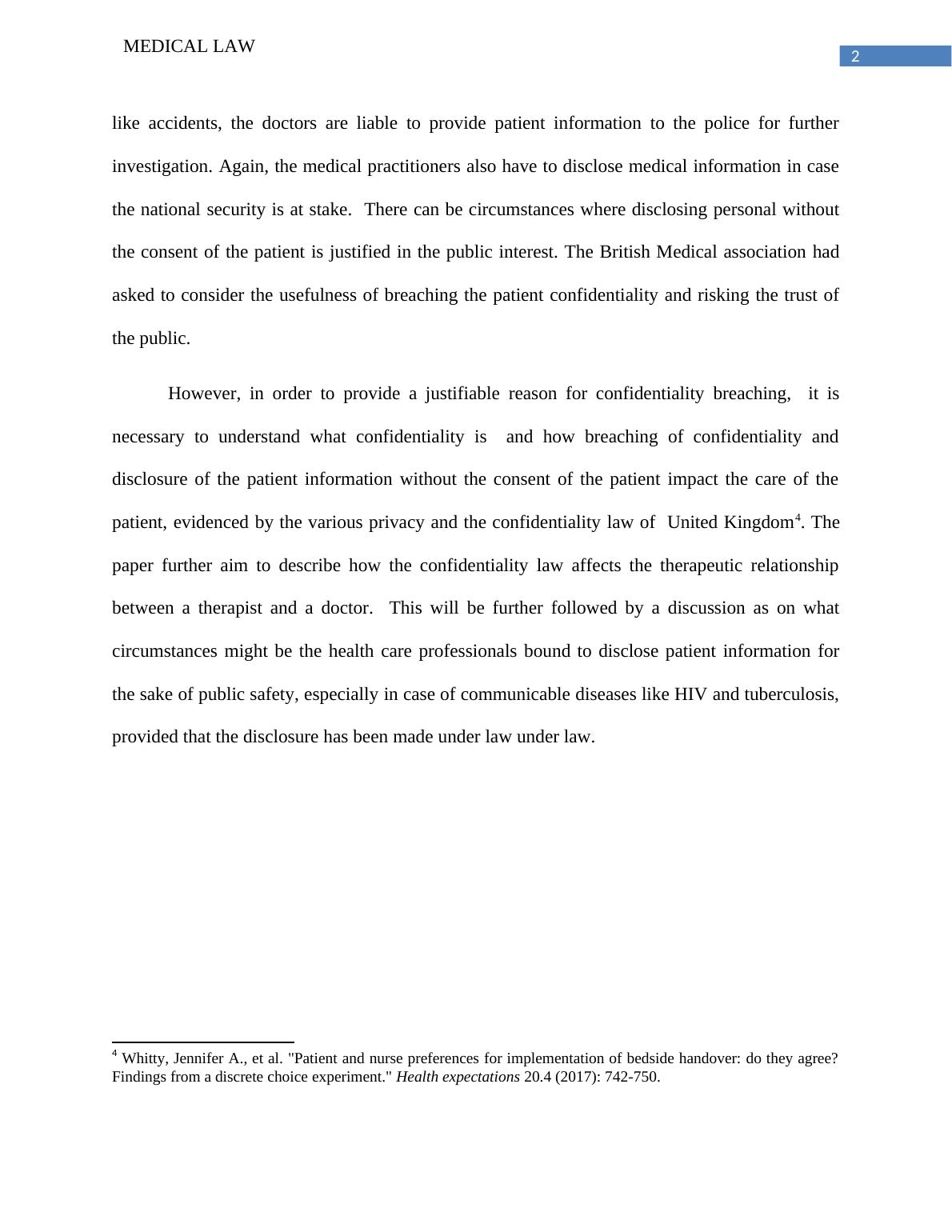
3
MEDICAL LAW
Confidentiality in patient and doctor relationship:
The ethics of confidentiality in clinical settings is often experience dilemma. The privacy
restrictions are not clear always and a patient can stop interacting with their physician if the
patient is not comfortable about sharing the information with the physicians, feeling unsure about
the security of the information5. Confidentiality in clinical setting involves a careful equilibrium
of respecting the autonomy of the patient and protecting the personal information of the patient
as a form of obtaining consent if disclosure of the information is contemplated. While sharing
patient information with physician and the medical team is important for the patient and family
members, keeping the data private and confidential in order to protect patient’s dignity and
interest is also crucial for a physician6. It is often observed that patient does not understand the
complete implication of why sharing information with the physician is crucial to their care and
hence they hesitate to share their information with physicians which further resulted in the
discrepancy of the care7. In order to minimize dilemma experienced by the patient regarding their
personal information and improving quality of care, the concept of confidentiality was
introduced in the medical ethics as a part of showing respect to the autonomy of patients. While
discussing confidentiality, it is crucial to mention privilege communication which is defined as
5 Bourgeois, Fabienne C., Daniel J. Nigrin, and Marvin B. Harper. "Preserving patient privacy and
confidentiality in the era of personal health records." Pediatrics 135.5 (2015): e1125-e1127.
6 Beltran-Aroca, Cristina M., et al. "Confidentiality breaches in clinical practice: what happens in
hospitals?." BMC medical ethics 17.1 (2016): 52.
7 Friberg von Sydow, Rikard. "Medical Records-The Different Data Carriers Used in Sweden from the End of
the 19th Century Until Today and Their Impact on Confidentiality, Integrity and Availability." (2017): 41-60.
MEDICAL LAW
Confidentiality in patient and doctor relationship:
The ethics of confidentiality in clinical settings is often experience dilemma. The privacy
restrictions are not clear always and a patient can stop interacting with their physician if the
patient is not comfortable about sharing the information with the physicians, feeling unsure about
the security of the information5. Confidentiality in clinical setting involves a careful equilibrium
of respecting the autonomy of the patient and protecting the personal information of the patient
as a form of obtaining consent if disclosure of the information is contemplated. While sharing
patient information with physician and the medical team is important for the patient and family
members, keeping the data private and confidential in order to protect patient’s dignity and
interest is also crucial for a physician6. It is often observed that patient does not understand the
complete implication of why sharing information with the physician is crucial to their care and
hence they hesitate to share their information with physicians which further resulted in the
discrepancy of the care7. In order to minimize dilemma experienced by the patient regarding their
personal information and improving quality of care, the concept of confidentiality was
introduced in the medical ethics as a part of showing respect to the autonomy of patients. While
discussing confidentiality, it is crucial to mention privilege communication which is defined as
5 Bourgeois, Fabienne C., Daniel J. Nigrin, and Marvin B. Harper. "Preserving patient privacy and
confidentiality in the era of personal health records." Pediatrics 135.5 (2015): e1125-e1127.
6 Beltran-Aroca, Cristina M., et al. "Confidentiality breaches in clinical practice: what happens in
hospitals?." BMC medical ethics 17.1 (2016): 52.
7 Friberg von Sydow, Rikard. "Medical Records-The Different Data Carriers Used in Sweden from the End of
the 19th Century Until Today and Their Impact on Confidentiality, Integrity and Availability." (2017): 41-60.
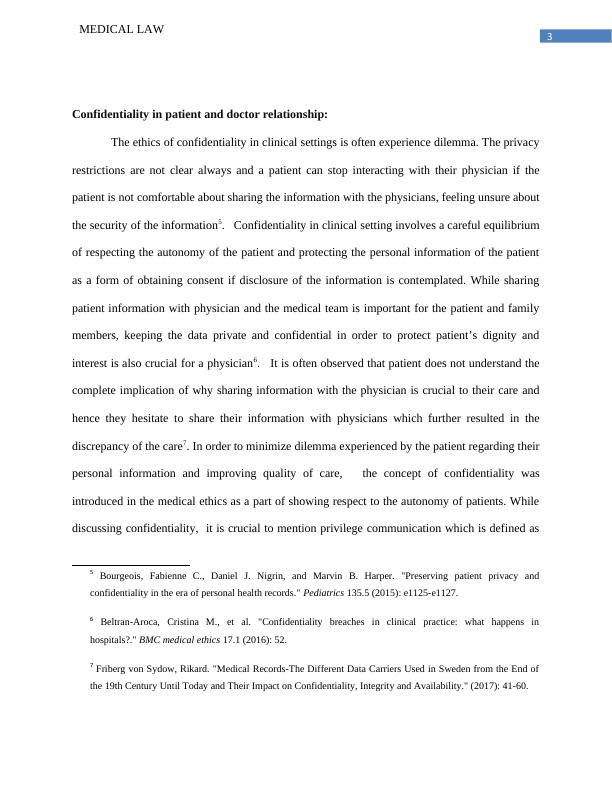
4
MEDICAL LAW
the information between two parties in which the law recognize a private and protected
relationship and cannot force their disclosure. As discussed by Bourgeois et al. (2015), informed
consent is a process that is designed to inform patients that their information will be confidential
with an intention of providing patients a sense of security and avoiding any ethical or legal
issues. Hence confidentiality is a crucial part of clinical practice and informed consent is the
process by which clinicians provide assurance to patients regarding the safety of their personal
information8. The confidential patient document includes theatre list, electronic data sharing,
photography and video forming part of the patient record, the image of internal organs,
pathology slides and radiographic image9. In other words, any information which can recognize
a patient is confidential data. Although managing confidentiality is directed by legal principles
an ethical principles, many uncertain situations still arise in the journey of patient care where
personal information of the patient is disclosed for the public interest10. In these situations, the
privileged communication stops being private for justified reasons. These situations and
associated medical laws would be discussed in details in the later part of the assistance.
Confidentiality Based on Ethics:
In the clinical setting, confidentiality is part of the basic clinical practice where
breaching confidentiality is against clinical ethics. It goes back to the Hippocratic Oath according
to which whatever seen or heard which one should not talk about should be kept as a secret11. As
8 Jilka, Sagar Ramesh, et al. "“Nothing About Me Without Me”: an interpretative review of patient accessible
electronic health records." Journal of medical Internet research 17.6 (2015): e161.
9 Bourgeois, Fabienne C., Daniel J. Nigrin, and Marvin B. Harper. "Preserving patient privacy and
confidentiality in the era of personal health records." Pediatrics 135.5 (2015): e1125-e1127.
10 Whitty, Jennifer A., et al. "Patient and nurse preferences for implementation of bedside handover: do they
agree? Findings from a discrete choice experiment." Health expectations 20.4 (2017): 742-750.
11 Musitelli, Sergio. "The Hippocratic oath (some further reasonable hypotheses)." Research (2014).
MEDICAL LAW
the information between two parties in which the law recognize a private and protected
relationship and cannot force their disclosure. As discussed by Bourgeois et al. (2015), informed
consent is a process that is designed to inform patients that their information will be confidential
with an intention of providing patients a sense of security and avoiding any ethical or legal
issues. Hence confidentiality is a crucial part of clinical practice and informed consent is the
process by which clinicians provide assurance to patients regarding the safety of their personal
information8. The confidential patient document includes theatre list, electronic data sharing,
photography and video forming part of the patient record, the image of internal organs,
pathology slides and radiographic image9. In other words, any information which can recognize
a patient is confidential data. Although managing confidentiality is directed by legal principles
an ethical principles, many uncertain situations still arise in the journey of patient care where
personal information of the patient is disclosed for the public interest10. In these situations, the
privileged communication stops being private for justified reasons. These situations and
associated medical laws would be discussed in details in the later part of the assistance.
Confidentiality Based on Ethics:
In the clinical setting, confidentiality is part of the basic clinical practice where
breaching confidentiality is against clinical ethics. It goes back to the Hippocratic Oath according
to which whatever seen or heard which one should not talk about should be kept as a secret11. As
8 Jilka, Sagar Ramesh, et al. "“Nothing About Me Without Me”: an interpretative review of patient accessible
electronic health records." Journal of medical Internet research 17.6 (2015): e161.
9 Bourgeois, Fabienne C., Daniel J. Nigrin, and Marvin B. Harper. "Preserving patient privacy and
confidentiality in the era of personal health records." Pediatrics 135.5 (2015): e1125-e1127.
10 Whitty, Jennifer A., et al. "Patient and nurse preferences for implementation of bedside handover: do they
agree? Findings from a discrete choice experiment." Health expectations 20.4 (2017): 742-750.
11 Musitelli, Sergio. "The Hippocratic oath (some further reasonable hypotheses)." Research (2014).
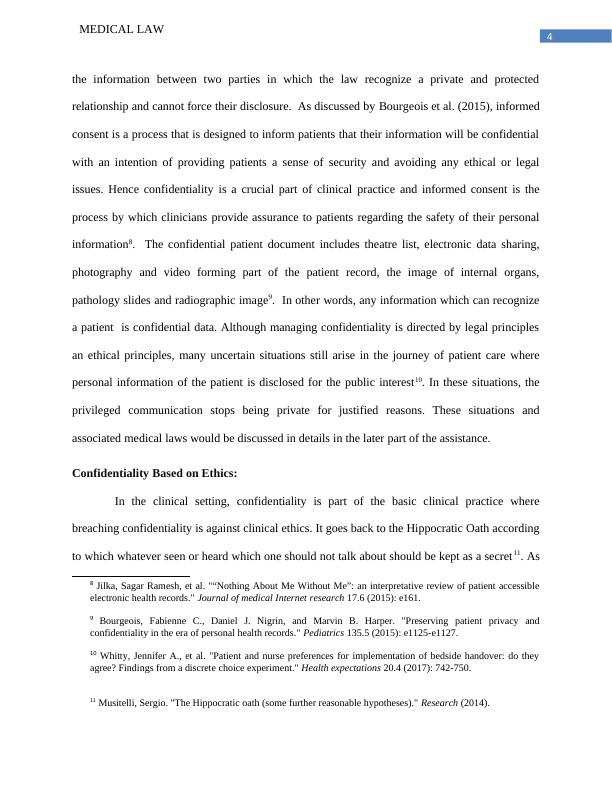
5
MEDICAL LAW
per the ethics of clinical practice, confidentiality can be defined as the proposition wherein the
information about you is given by yourself or someone else is kept safe and secure from others
while being in a professional relationship like doctor-patient. The whole doctor-patient
relationship is based on trust, for which confidentiality is necessary. The same has given value in
the UK NHS Confidentiality Code of Practice, Hippocratic Oath, as well as in the NHS
Constitution12.
It's a doctor's responsibility to respect his patient's privacy because a) Individual's
medical information is private; b) its choice of the patient to disclose his information if relevant
for diagnosis or research as it comes under the confidentiality act13. Breaching confidentiality has
major consequences on the patients, health care professionals, and health care sectors.
Legislations associated with maintaining Individual's Confidentiality:
The legislation that is associated with the confidentiality of individuals includes:
1. Data protection act 2018:
This legislation is the implementation of the general data protection regulation which
states that information of patients should be handled lawfully and fairly. By handling the
information lawfully means, saving the data with protections and using such information with the
permission of the associated person. The health professionals only allowed to use this
12 Chan, Tom, et al. "The UK National Data Guardian for health and care’s review of data security, consent and
opt-outs: leadership in balancing public health with rights to privacy?." BMJ Health & Care Informatics 23.3
(2016): 627-632.
13 Bourgeois, Fabienne C., Daniel J. Nigrin, and Marvin B. Harper. "Preserving patient privacy and
confidentiality in the era of personal health records." Pediatrics 135.5 (2015): e1125-e1127.
MEDICAL LAW
per the ethics of clinical practice, confidentiality can be defined as the proposition wherein the
information about you is given by yourself or someone else is kept safe and secure from others
while being in a professional relationship like doctor-patient. The whole doctor-patient
relationship is based on trust, for which confidentiality is necessary. The same has given value in
the UK NHS Confidentiality Code of Practice, Hippocratic Oath, as well as in the NHS
Constitution12.
It's a doctor's responsibility to respect his patient's privacy because a) Individual's
medical information is private; b) its choice of the patient to disclose his information if relevant
for diagnosis or research as it comes under the confidentiality act13. Breaching confidentiality has
major consequences on the patients, health care professionals, and health care sectors.
Legislations associated with maintaining Individual's Confidentiality:
The legislation that is associated with the confidentiality of individuals includes:
1. Data protection act 2018:
This legislation is the implementation of the general data protection regulation which
states that information of patients should be handled lawfully and fairly. By handling the
information lawfully means, saving the data with protections and using such information with the
permission of the associated person. The health professionals only allowed to use this
12 Chan, Tom, et al. "The UK National Data Guardian for health and care’s review of data security, consent and
opt-outs: leadership in balancing public health with rights to privacy?." BMJ Health & Care Informatics 23.3
(2016): 627-632.
13 Bourgeois, Fabienne C., Daniel J. Nigrin, and Marvin B. Harper. "Preserving patient privacy and
confidentiality in the era of personal health records." Pediatrics 135.5 (2015): e1125-e1127.
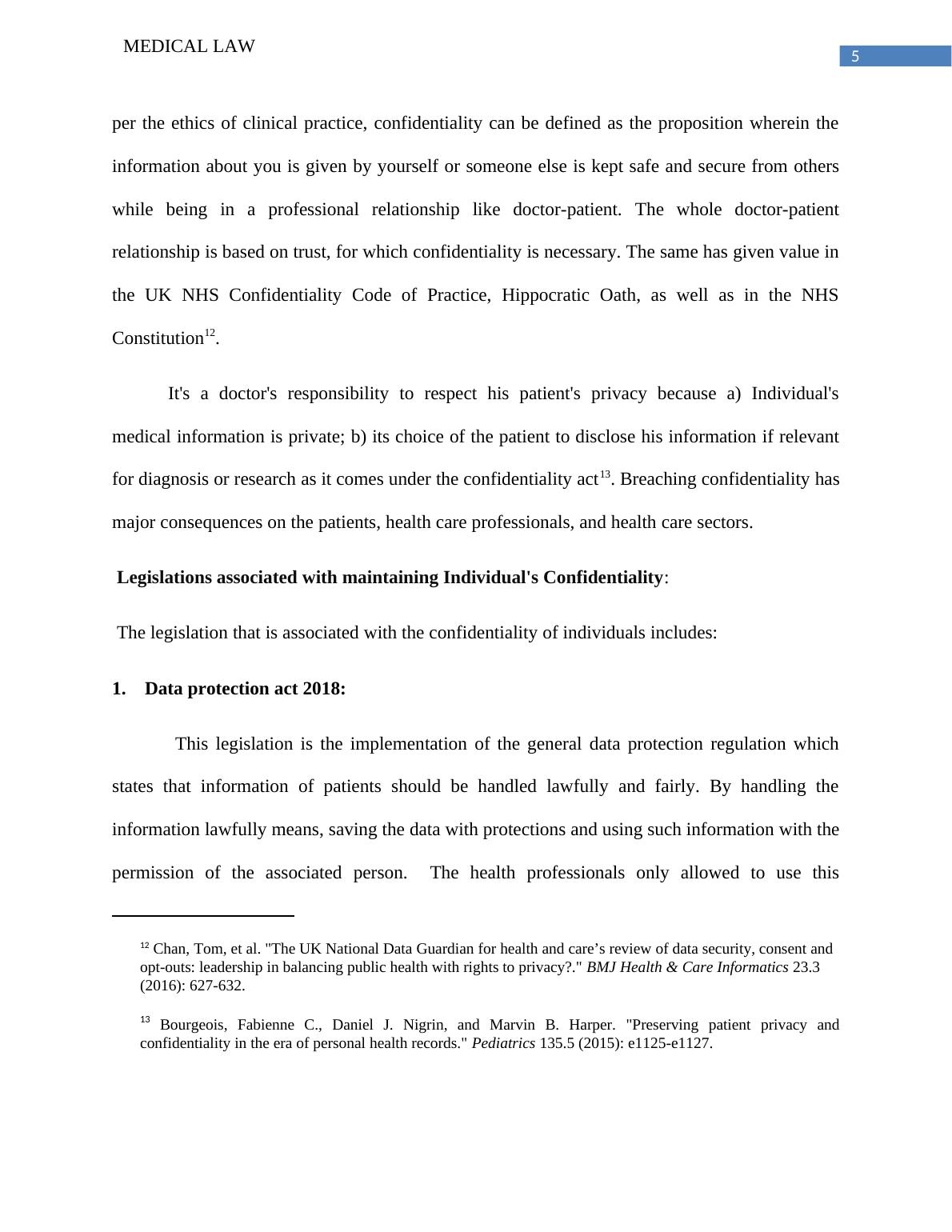
End of preview
Want to access all the pages? Upload your documents or become a member.
Related Documents
Report on Medical Law and Ethicslg...
|7
|1179
|42
Global Issue in Health Care - Essaylg...
|6
|1596
|46
Assignment on confidentiality PDFlg...
|7
|1633
|24
Legal And Ethical Decision Making Reportlg...
|4
|707
|17
Ethical Standards of Nursing Practice | Reportlg...
|7
|1442
|17
History and Bioethics of HIV Counselinglg...
|5
|929
|137
